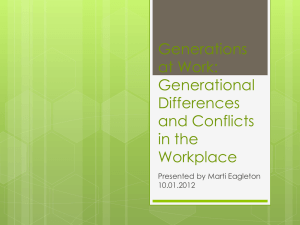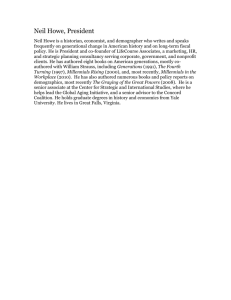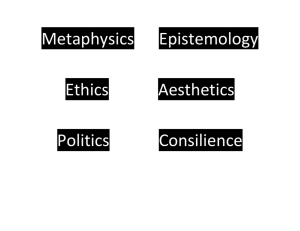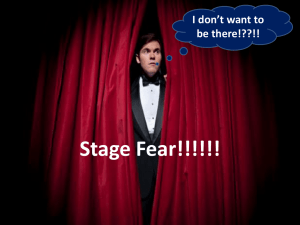Communicating with the Next Generations
advertisement
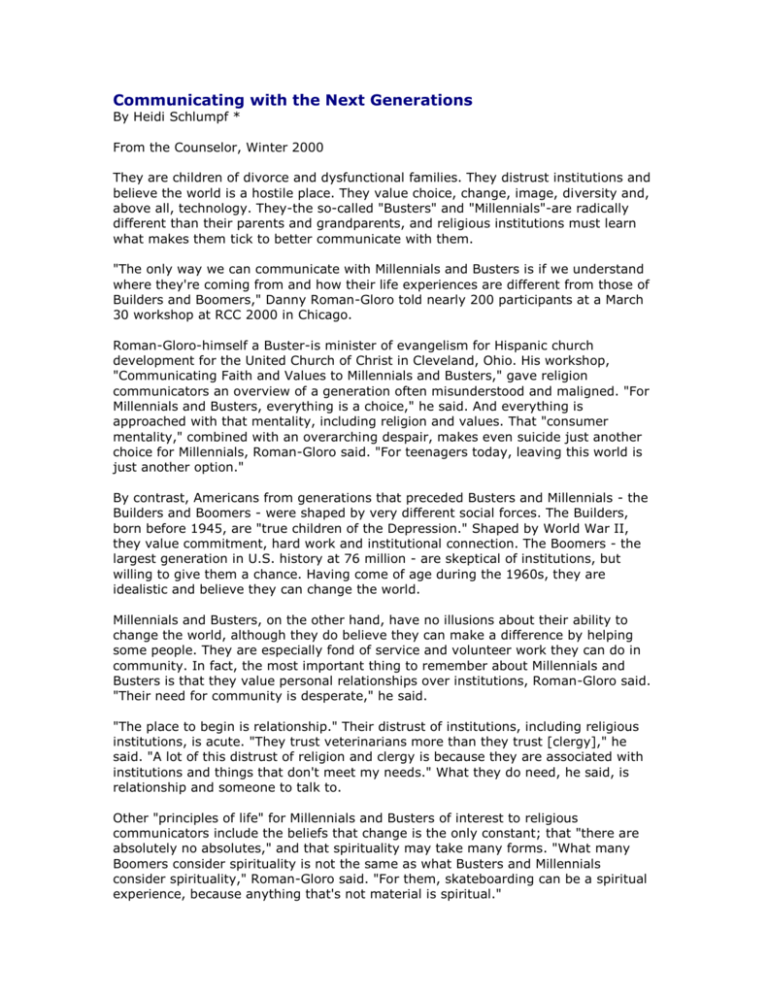
Communicating with the Next Generations By Heidi Schlumpf * From the Counselor, Winter 2000 They are children of divorce and dysfunctional families. They distrust institutions and believe the world is a hostile place. They value choice, change, image, diversity and, above all, technology. They-the so-called "Busters" and "Millennials"-are radically different than their parents and grandparents, and religious institutions must learn what makes them tick to better communicate with them. "The only way we can communicate with Millennials and Busters is if we understand where they're coming from and how their life experiences are different from those of Builders and Boomers," Danny Roman-Gloro told nearly 200 participants at a March 30 workshop at RCC 2000 in Chicago. Roman-Gloro-himself a Buster-is minister of evangelism for Hispanic church development for the United Church of Christ in Cleveland, Ohio. His workshop, "Communicating Faith and Values to Millennials and Busters," gave religion communicators an overview of a generation often misunderstood and maligned. "For Millennials and Busters, everything is a choice," he said. And everything is approached with that mentality, including religion and values. That "consumer mentality," combined with an overarching despair, makes even suicide just another choice for Millennials, Roman-Gloro said. "For teenagers today, leaving this world is just another option." By contrast, Americans from generations that preceded Busters and Millennials - the Builders and Boomers - were shaped by very different social forces. The Builders, born before 1945, are "true children of the Depression." Shaped by World War II, they value commitment, hard work and institutional connection. The Boomers - the largest generation in U.S. history at 76 million - are skeptical of institutions, but willing to give them a chance. Having come of age during the 1960s, they are idealistic and believe they can change the world. Millennials and Busters, on the other hand, have no illusions about their ability to change the world, although they do believe they can make a difference by helping some people. They are especially fond of service and volunteer work they can do in community. In fact, the most important thing to remember about Millennials and Busters is that they value personal relationships over institutions, Roman-Gloro said. "Their need for community is desperate," he said. "The place to begin is relationship." Their distrust of institutions, including religious institutions, is acute. "They trust veterinarians more than they trust [clergy]," he said. "A lot of this distrust of religion and clergy is because they are associated with institutions and things that don't meet my needs." What they do need, he said, is relationship and someone to talk to. Other "principles of life" for Millennials and Busters of interest to religious communicators include the beliefs that change is the only constant; that "there are absolutely no absolutes," and that spirituality may take many forms. "What many Boomers consider spirituality is not the same as what Busters and Millennials consider spirituality," Roman-Gloro said. "For them, skateboarding can be a spiritual experience, because anything that's not material is spiritual." To Builders and Boomers who find "skateboarding as spirituality" a little difficult to swallow, Roman-Gloro reminds us that "we are living in another social revolution today." The models of institutions, including churches, are being challenged because Busters and Millennials are saying, "We do not want up-and-down structures. We want horizontal structures that emphasize relationship." In effect, Busters and Millennials are telling their elders: "That was fine for you, but we're living in a different world," Roman-Gloro said. For religious communicators trying to connect with the younger generation, Roman-Gloro suggested emphasizing storytelling. "Stories are very important," he said. "Especially personal stories about conversion or about how someone got through something." Transparency and authenticity are essential when sharing stories with cynical Busters and Millennials, he added. The future, Roman-Gloro predicted, is the Internet -- especially for generations who believe that technology is a natural ally. "Everything has to be in the Internet," he said. "And Web sites must be interactive. They're really searching for that personal contact." * Heidi Schlumpf, a volunteer reporter at RCC 2000, is Assistant Editor, "U.S. Catholic."



